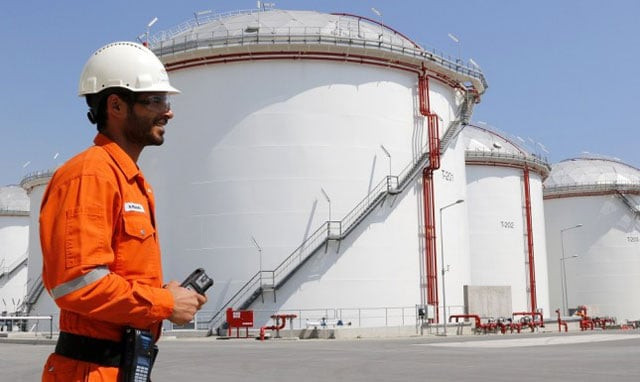Pakistan increasing storage capacity to more than 20 days
Oil companies set to replace outdated petroleum products with higher quality fuels

PHOTO: AFP
“Pakistan State Oil (PSO), Hascol Petroleum and a third party {Frontier Works Organisation} are adding to the storage capacity,” said Shahid Khaqan Abbasi while talking to media at the launch of premium petroleum products by PSO.
He said the storage capacity was being scaled up despite a significantly higher demand for petroleum products. “Last year, the country saw a 17% increase in demand,” he said.
Hascol to build oil storage facility at Port Qasim
At present, most of the oil marketing companies usually maintain oil stocks that could meet demand for about 15 to 17 days. A major part of the demand is met through imports.
The reserves help streamline the supply of oil to vehicles on roads, aviation industry and armed forces. The jump in demand is the result of cars switching over to petrol from hardly available compressed natural gas, exponential increase in the number of vehicles and surge in use of power generators.
The minister added other oil marketing companies were also set to replace soon their outdated petroleum products with fuel of international standards.
“The market has been demanding upgraded fuel for quite some time,” Abbasi said. “Modern luxury vehicles need this premium quality fuel which enhances engine performance and per-kilometer mileage and is environment friendly.”
Port Qasim: Fotco, Trans Group pumping $25m for oil storage facility
Earlier, PSO formally launched the improved quality petroleum products which replaced two of its largely sold vehicle fuels. Accordingly, Altron Premium (RON 92) and Altron X High Performance (RON 95-97) replaced Premier XL Gasoline (RON 87) and HOBC respectively.
“The colour of new oil products is different {green}. They also contain DNA, the feature that checks and maintains product quality at any time in the entire supply chain. It will also help avoid counterfeit and contaminated products,” he said.
The new oil products have a reduced impact on environment. They have been in demand since Japanese car assemblers rolled out Euro-II engine vehicles.
Cost factor
The prices of the new products would be comparatively higher because of the quality factor. The new price of Altron Premium will be announced at next meeting of the ministry that usually takes place at the end of every month. Till then, it will remain available at current prices.
The price of Altron X High Performance would go up by Rs5-7 per litre, it was learnt.
Abbasi said though all imports would now have upgraded fuel, the government would not regulate prices of the Altron X quality.
He said Pakistan was still offering oil products at much cheaper rates than other economies. “In our neighbouring country, the price of petrol exceeds Rs100 per litre, a difference of around 50%,” he added.
Abbasi said the government would try its best to overcome a huge gas shortage through additional imports in the approaching winter days. “There is a 40% shortage of gas on the Sui Northern Gas Pipelines’ network,” he said.
He said the agreement to import re-gasified liquefied natural gas with Qatargas was executed at low prices. “If I am found guilty of wrongdoing, then I am ready to go to jail,” he said.
Last year, the government signed an import deal with the Qatari firm, which would supply gas to Pakistan for 15 years at a price of 13.37% of Brent crude oil rate.
Published in The Express Tribune, November 17th, 2016.
Like Business on Facebook, follow @TribuneBiz on Twitter to stay informed and join in the conversation.



















COMMENTS
Comments are moderated and generally will be posted if they are on-topic and not abusive.
For more information, please see our Comments FAQ